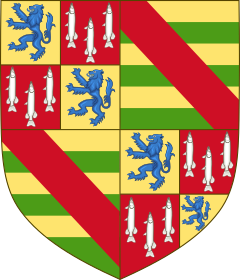Henry Percy, 4th Earl of Northumberland facts for kids
Quick facts for kids
Henry Percy
|
|
|---|---|
| Earl of Northumberland | |

Quartered arms
|
|
| Born | 1449 Leconfield, Yorkshire, England |
| Died | 28 April 1489 (aged 40) South Kilvington, Yorkshire, England |
| Noble family | Percy |
| Spouse(s) | Maud Herbert |
| Issue | Eleanor Percy, Duchess of Buckingham Henry Algernon Percy, 5th Earl of Northumberland Sir William Percy Alan Percy Sir Josceline Percy Arundel Percy Anne Percy, Countess of Arundel Elizabeth Percy |
| Father | Henry Percy, 3rd Earl of Northumberland |
| Mother | Eleanor Poynings |
Henry Percy, the 4th Earl of Northumberland (born around 1449, died 1489), was an important English noble. He lived during a time of big conflicts called the Wars of the Roses. These wars were fought between two powerful families, the Houses of York and Lancaster.
Henry Percy lost his noble title when his father died fighting for the Lancasters. But he worked hard and got his title back later. He was part of King Richard III's army at the famous Battle of Bosworth. However, his troops didn't join the fight, which was a big moment in the battle.
After the battle, he was briefly put in prison by the new king, Henry VII. But King Henry VII soon gave him back his lands and titles. Sadly, a few years later, Henry Percy was killed by people in Yorkshire during a protest against new taxes.
Contents
Family Background
Henry Percy was the son of Henry Percy, 3rd Earl of Northumberland. His mother was Eleanor Poynings. The Percy family was very powerful in northern England.
His father was a cousin to many important people. These included Edward IV of England and Richard III of England. This meant Henry Percy himself was also related to many royal figures.
Losing and Getting Back His Title
Henry Percy's father was very loyal to the House of Lancaster. This family was fighting against the House of York in the Wars of the Roses. Henry Percy's father was killed in a big battle called the Battle of Towton in 1461.
Because his father died fighting for the losing side, young Henry Percy lost his family's noble title. He was also put in prison, first in the Fleet Prison and then in the Tower of London.
In 1465, another noble, John Neville, was given the title of Earl of Northumberland instead. But Henry Percy eventually promised his loyalty to the new King, Edward IV. He was then set free in 1469.
Henry Percy asked King Edward IV to give him back his family's titles and lands. King Edward IV agreed. John Neville had to give up the Northumberland title. In 1473, Henry Percy officially got his title back. In 1474, King Edward IV made him a Knight of the Garter, which was a very special honor.
For the next 12 years, Henry Percy held many important jobs in northern England. He helped protect the borders, which was a traditional role for his family.
The Battle of Bosworth Field
In 1485, Henry Percy was a commander in King Richard III's army. This was during the Battle of Bosworth Field. This battle was a major turning point in the Wars of the Roses.
Henry Percy's troops were held back from the main fight. For reasons that historians still debate, his forces never joined the battle. This lack of action played a big part in King Richard III's defeat and death. Some historians think Henry Percy might have secretly supported Henry Tudor, who won the battle. Others believe his troops were simply in a bad position to join the fight.
After the Battle
After the battle, Henry Percy was arrested. But he quickly promised his loyalty to the new King, Henry VII. King Henry VII released him after a few months.
Henry Percy was allowed to keep his titles and lands. He also got his old jobs back. King Henry VII even sent him on important trips for the country. This shows that the new king trusted Henry Percy.
Family Life
Henry Percy married Maud Herbert sometime between 1473 and 1476. She was the daughter of William Herbert, 1st Earl of Pembroke. They had several children, including:
- Henry Algernon Percy (died 1527), who became the next Earl.
- Eleanor Percy (died 1530).
- Sir William Percy (died 1540).
- Alan Percy (died 1560), who became a master at St John's College, Cambridge.
- Sir Josceline Percy (died 1532).
- Anne Percy (died 1552).
His Death
In April 1489, Henry Percy was staying at his estates in Yorkshire. At this time, King Henry VII had made an alliance with another country. This meant that taxes were raised to pay for military actions.
Many people in Yorkshire were unhappy about these high taxes. A protest, known as the Yorkshire rebellion, began. Henry Percy was seen as a symbol of the king's power and the new taxes.
On April 28, 1489, protesters attacked Henry Percy. He was killed during the riot. He was buried at Beverley Minster.
 | Jewel Prestage |
 | Ella Baker |
 | Fannie Lou Hamer |

